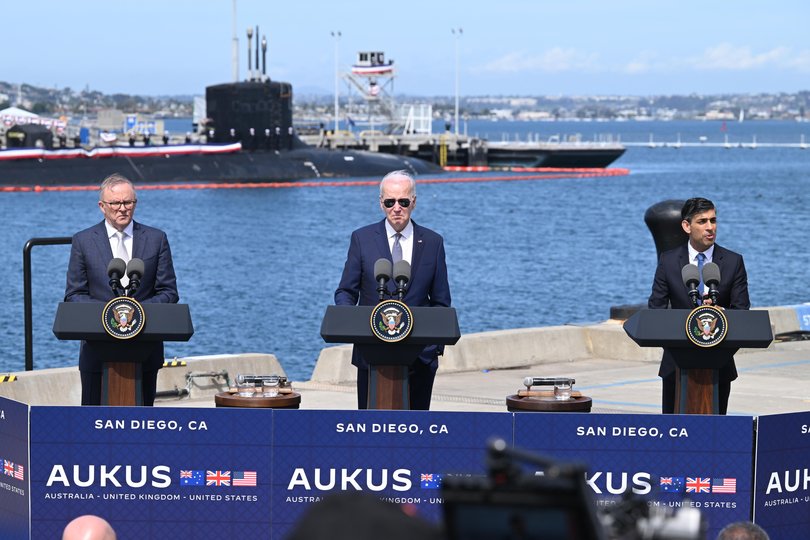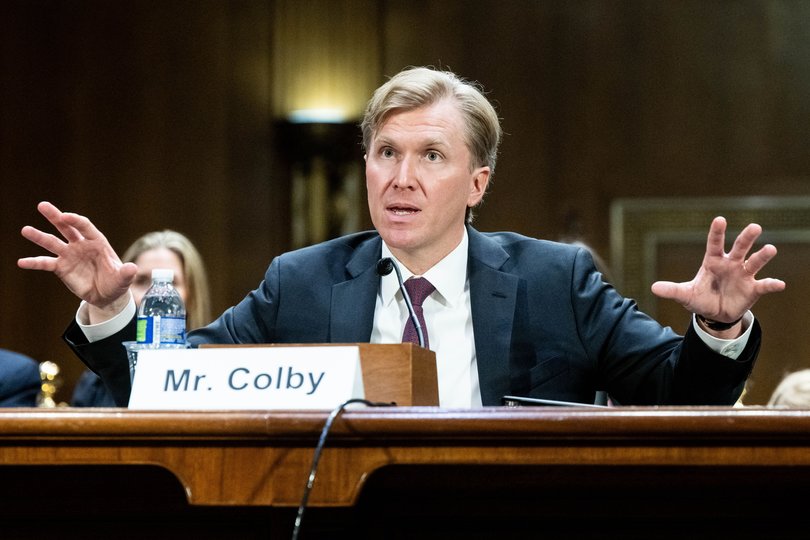Defence Minister Richard Marles goes into damage control as AUKUS review sparks concerns of a Trump torpedo
Defence Minister Richard Marles goes into damage control as the Pentagon’s inquiry into the $368b submarine pact sparks concerns of an ‘America First’ Trump torpedo for the security scheme.

Defence Minister Richard Marles on Thursday was forced to pour cold water on fears over a new Pentagon inquiry into the $368 billion AUKUS pact, revealed ahead of a G7 summit where the Prime Minister is expected to face renewed US pressure to lift defence spending.
Reports that the Pentagon would assess whether the AUKUS nuclear-powered submarine program aligned with President Donald Trump’s “America First” agenda triggered a political stoush in Canberra over the future of a project deemed vital to Australia’s national security in an era of rising strategic threats.
But Mr Marles immediately moved to quell fears that AUKUS would be torpedoed, insisting in multiple media interviews that he was “very confident” the mammoth defence partnership between the US, UK and Australia would go ahead.
Sign up to The Nightly's newsletters.
Get the first look at the digital newspaper, curated daily stories and breaking headlines delivered to your inbox.
By continuing you agree to our Terms and Privacy Policy.He downplayed concerns about the review, describing it as a “natural” move for a new administration that followed a similar “positive” inquiry by the British Government following the election of Prime Minister Sir Keir Starmer.
“We are committed to AUKUS and we look forward to working closely with the US on the review,” he said, confirming that Canberra had been given advance notice.
Mr Marles, who made an $800 million down payment on the submarine program earlier this year, pointed to bipartisan support in the United States for the program, and he urged shadow defence minister Angus Taylor to “take a breath” after he called the US move “deeply concerning”.
Mr Taylor called on Prime Minister Anthony Albanese to urgently seek a direct meeting with President Trump to “ensure Australia’s national interests are protected”.
Mr Albanese is expected to speak with Mr Trump about defence and the US’ sweeping trade tariffs on the sidelines of the G7 summit in Canada this weekend, though a one-on-one meeting has not yet been confirmed.

Mr Taylor questioned whether the review had been triggered by the Albanese Government’s refusal to commit to US demands to hike defence spending to 3.5 per cent of GDP.
“Australia cannot afford to be seen as a fair-weather friend. This government has sent mixed messages to our allies, and we’re now seeing the consequences,” he said.
“If AUKUS falls over it is Australia that pays the price. We would face a dangerous gap in capability at a time when we lack the capacity to go it alone,” he said.
Former prime ministers, including AUKUS critics Paul Keating and Malcolm Turnbull, also weighed in on the debate with Mr Keating saying it “might very well be the moment Washington saves Australia from itself”.
A vocal AUKUS critic, Mr Keating labelled the agreement “the most poorly conceived defence procurement program ever adopted by an Australian government”.
However, former Liberal prime minister Scott Morrison, whose government oversaw the creation of AUKUS in 2021, urged people not to “over-interpret” a departmental review, arguing America was “within its remit” to examine the multibillion-dollar pact.
Mr Morrison said he had “never had concerns” about Mr Trump’s commitment to AUKUS, but added, “we need to engage with that and make the case again”.
Defence experts argue Mr Albanese should signal a stronger intent to raise national defence spending directly with Mr Trump after Washington urged Canberra this month to increase that investment to 3.5 per cent of GDP as soon as possible.
Washington’s demands come amid an unprecedented military build-up in China as Beijing seeks to expand its footprint across the Indo-Pacific in a regional competition with the United States.
“(Mr Albanese) does need to address defence spending. This is going to be a problem for us if we don’t address it, not because the US are pushing us, but because we have capability gaps,” said Jennifer Parker, an expert associate at the ANU’s national security college.
Dr Malcolm Davis, a senior analyst at the Australian Strategic Policy Institute (ASPI), advised Mr Albanese to “put a figure” on a budget hike to avoid undermining the AUKUS review.
The upcoming stocktake is understood to have been flagged by the US to its AUKUS partners several weeks ago and will be led by the Pentagon’s Deputy Under Secretary of Defence for Policy, Elbridge Colby.

The involvement of Mr Colby, a known China hawk, has stoked alarm due to his past scepticism about the concept and direction of the AUKUS project.
AUKUS aims to deliver a nuclear-powered submarine capability for Australia with the help of the US and the UK, as well as boosting trilateral defence cooperation on cyber and artificial intelligence and other cutting-edge technologies.
The first stage involves British and American nuclear submarines rotating through Perth from 2027 before the sale of US Navy Virginia-class attack submarines to Australia in the early 2030s.
In the latter stage, Australia will construct a new SSN-Aukus fleet in Adelaide.
Mr Colby is one of the America First movement’s fiercest critics of what he views as shirker allies. He was also the first in Mr Trump’s orbit to voice concerns about AUKUS. When asked by The Nightly, at a speaking engagement in London, he said he would have been quite sceptical about the deal if it were put to him to sign off on.
“My concern is why are we giving away this crown jewel asset when we most need it?” he said 12 months ago.
“AUKUS is only going to lead to more submarines collectively in 10, 15, 20 years, which is way beyond the window of maximum danger, which is really in this decade. “So the benefits are questionable and the viability is also questionable.”
However, Mr Colby has retreated from some of his criticisms and in his recent confirmation hearing in the Senate Armed Services Committee, he also expressed support for AUKUS.
“I think it should be the policy of the United States Government to do everything we can to make this work,” he said.
Dr Davis, who is a personal acquaintance of Mr Colby, dismissed concerns about his leadership of the Pentagon review.
“He’s a smart guy,” he said.
“He understands that it’s important to make AUKUSJU work because it benefitsJU the US as well as Australia and the UK.”
